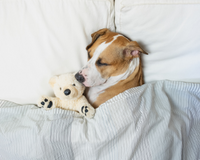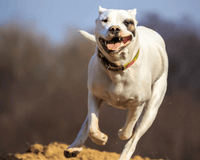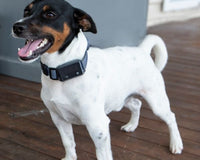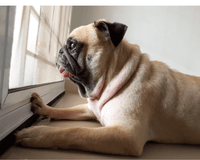Dog and human body language although appearing similar is not be translated directly. Translating your dogs body language as if he or she was a human is not always the right choice, if you understand what your dog is trying to tell you by its movements, it can enhance the communication between you both.
Here are a few topics, actions and solutions to common questions!
My dog is always jumping up on me and sometimes strangers, why?
This action can have two meanings, one slightly more loving that the other!
Puppy’s have a natural instinct to jump up when greeting their mothers to get attention as well as let her know they are interested in her company, food or other offerings. This natural instinct also leads to excessive licking to show the love and affection the pup feels.
As your dog grows older jumping can be a sign of excitement or affection when you get home, enter a room or are encouraging play. The aim of the ‘jump’ can be to reach your face and mouth, your number one communication tool! Dogs tend to want to jump to be close to this area to show off their happiness as well as to assert themselves in the situation.
ie; ‘I am so happy your finally home, now please entertain me and don’t forget I am here’.
Although this action is ‘harmless’ in the scheme of things, we suggest discouraging when you can. Dogs need to understand that humans are the pack leaders at home and jumping excessively is not the ‘correct’ way to greet or continue affection.
However if your not fussed, they certainly aren’t either and will happily continue this form of affection. If your dog is doing this to strangers or as an immediate reaction to meeting a new person, you must keep an eye on it! Jumping on unknown people can be a form of dominance, stress and an attempt to gain control of the situation.
In the worst case, this form of jumping behaviour may lead to a confusion of who is in charge and in control.
I have heard mixed things about making eye contact with dogs. Is this action okay?
Dogs can understand eye contact in two ways (keeping in mind there is a big difference between eye contact and staring).
“Science has recently discovered another reason for eye contact with dogs: bonding. With your pet, eye contact increases a brain chemical called oxytocin, the very same chemical present in parent-child bonding. Scientists speculate that this bonding chemical is at least partly responsible for how dogs became domesticated in the first place. With your own pet, you, as the human owner, should always be the dominant figure or “pack leader.” A dog who believes they are the master is a dog that will not obey commands, and may even become aggressive. There is a difference between maintaining eye contact or staring, and even your own pet may become uncomfortable or feel threatened. If a dog becomes uncomfortable with the eye contact, they will either turn away or avert their eyes, walk away, or roll over.” - Wag Walking
Should I be concerned about my dog's clingy behaviour?
Clingy behaviour is completely normal if you spend a lot of time with your dog. They don’t say ‘Man's best friend’ for no reason! Clingy behaviour can be nurtured however it should not be ‘encouraged’, this can cause destress to your dog if you leave the home or go on a holiday without them.
If your dog is elderly we 100% suggest accommodating for their clingy behaviour as a change in routine or your attitude towards them may cause more harm than worth.
Dogs clingy behaviour can stem from a range of reasons however the most common is anxiety of being alone or bored. If your dog is not socialised or treated as a ‘dog’ in balanced proportions it can loose sight of its sense of place within the environment.
This feeling can evoke thoughts of ‘If I am not with my owner, I will be bored, lonely or confused as to where I belong’. We suggest introducing your dog to interactive toys if you find this habit developing or a play mate if you able to.
Interactive toys such as dog puzzles, treat dispensers or nose making soft teddies can be a great introduction to teaching your dog of its self independence.
Why is my dog always hanging around my feet?
Dogs love smells! What tends to smell… feet! Surprisingly our feet tend to smell the most like us, this extends to our shoes and socks. If your dog loves sitting, playing, licking and leaning on your feet it can be a sign of wanting to get closer to you and/or to know where you have been.
Our feet let off certain ‘chemicals’ as to what types of ground we have been walking on as well what we have eaten and drunk through our sweat. If your dog is dropping toys or ‘treats’ at your feet, he or she is trying to please you and ask for your acceptance!
This behaviour is nothing to be concerned about. If this behaviour becomes aggressive or turns more ‘stubborn’ in nature, you will need to look into why your dog feels the need to assert dominance towards you!
This is just the icing on the cake in regards to dog body language, we could be here for days!
We are passionate about dogs and are here to help with any problems you may need solved. Simply head back to our shop pages or give us a call to see what we can do for you!









